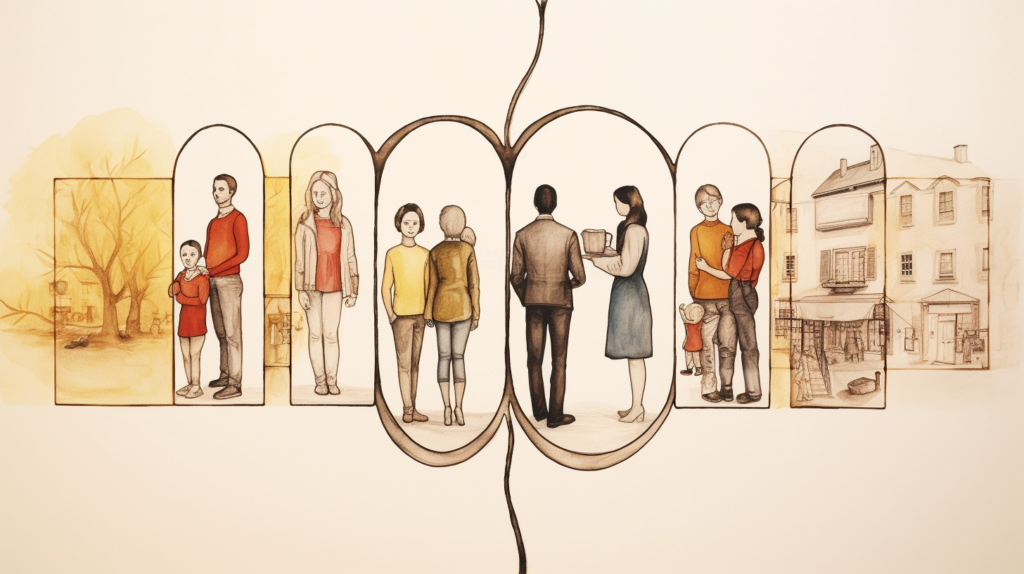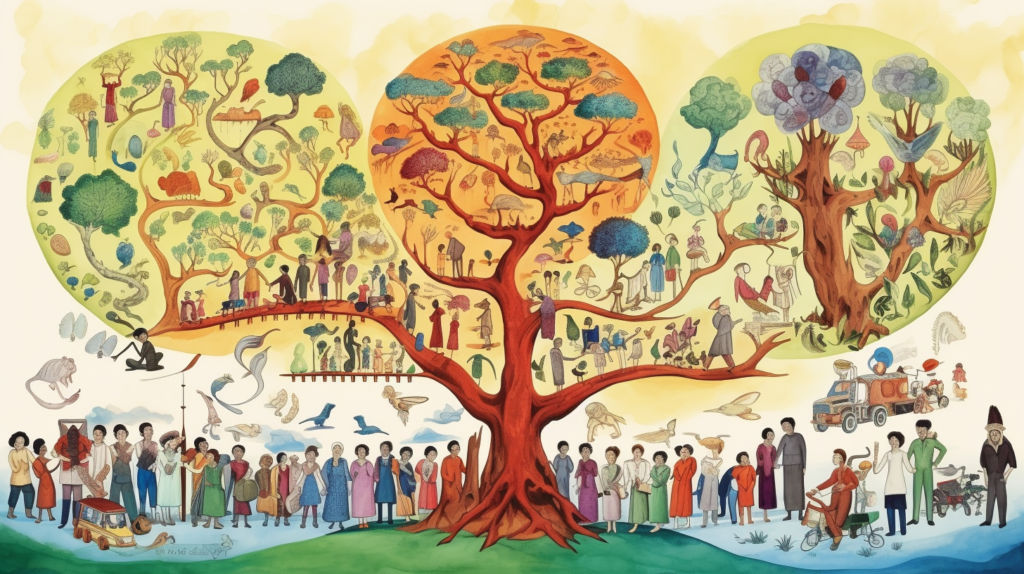Truth & Goodness
Poison on a Plate: What Drives Us to Eat Dangerously?
01 March 2026

Human life is not suspended in a vacuum. From the moment we are born, we function within the boundaries of various systems, typically several at a time – our family, school or professional environment, our circle of friends… The constellation of factors that influence the individual is incredibly wide-ranging, and the process itself is not one-sided but rather a pattern of reciprocal interactions.
Our day-to-day existence in today’s world is fast, intense and very demanding. Our energy is focused on the production of material goods, costing us a wealth of internal resources. We often zero in on the aim we want to achieve without taking stock of our inner assets, which are anything but infinite. In the past, we sought support from those in our environment; however, modern man has been increasingly labeled as omnipotent – able to achieve everything with no assistance from anyone.
According to Aristotle, humans are social beings. We are not made to function in isolation from other people. Indeed, one of the greatest human fears is the prospect of loneliness. Social deprivation gives rise to genuine suffering, while the natural developmental pattern of an individual is to gradually mature to take on the roles of a partner, mother or father.
This being said, starting a family and functioning within such a system is not the only expression of social bonding. By weaving a web of interconnected relationships, also outside of those people who are closest to us, we provide ourselves with a reward system.
As members of a group that meets our needs, we internalize, to some extent, our ideas of relationships, treating them as part of our own identity. This explains our concern for our family or friends – by protecting members of these groups, we protect ourselves, interpreting an attack on the ‘herd’ as an attack on ourselves.
The sense of belonging and the ability to provide ourselves with an identity are fundamental to the formation of our own self. These factors influence our self-image and allow us to refer to the values vital to our group, which prevents us from veering off the path in our daily lives. The feeling of community also gives us a sense of security, as our subconscious tells us that those who identify with our group will come to our aid at a time of danger. For this reason, when faced with serious challenges such as an exam session or a project at work, informal groups (students, colleagues) begin to form spontaneously and relatively quickly as a collective of members with common interests and the aim of meeting each other’s needs.

People perceive themselves as members of communities in a variety of ways. Societies traditionally associated with capitalism favor the individualist model. The United States is a case in point, with Japan being an exception. In the USA, with the rise of enormous corporations and the emergence of what we might call the ‘metropolitan lifestyle’, a cultural pattern of those who prioritize individual development and well-being above the common good has developed. A symptom of this way of thinking is a focus on career, self-fulfillment and self-reliance. Although Japan is a democratic and capitalist state, the traditional cultural pattern dictates an almost subservient attitude towards one’s superiors. Such perception of power, therefore, prevents the advancement of an individualistic approach to social functioning.
Collectivism, in turn, is defined by greater attachment to community values, such as relations within the family. Here, the good of the community prevails over the interests of the individual. Such a model predominates in highly hierarchical societies and also still, in post-communist societies. The former Eastern Bloc countries were subjected to many years of socialist rule. The utopian reasoning behind this system was the provision of ideal conditions for the development of the individual; giving them a sense of security and ensuring equality in accessing goods. However, this ideal became distorted, which led to the formation of covetous dictatorships and authoritarianism. In the process, however, the concept of the so-called Third Way also emerged, i.e. a political approach positioned somewhere between capitalism and communism. The ideology of social democracy is deeply ingrained in today’s Sweden and France, for example. This centrist position draws on the resources of the welfare state while preserving the freedom of the individual.

The balance between taking care of oneself, reflected in the ability to set one’s own boundaries, and caring for the community in which we live is a difficult art, and it is an expression of our desire to correctly function in society. Depending on the outlook prevalent within a given community, some features will be met with approval, while others with ostracism.
Communion and agency are the two scales developed by Polish psychologists Bogdan Wojciszke and Monika Szlendak based on the ideas of David Bakan and Vicki Helgeson.
The adequate intensity of the characteristics typical of both scales makes up the ideal of social functioning. However, we often feel lost as a result of the reality which surrounds us, and this fact pushes us towards one of the extremes. An excessive focus on ourselves and our own pleasure, expressed through the lack of sensitivity to the needs of others, as well as an unrealistically high opinion of our own self-efficacy, encourage us to use others to satisfy our egotistical needs. We treat other people as an obstacle to be overcome or as a means to an end. Alternatively, we might have such a strong belief in our agency that we fail to see that in order to achieve satisfaction in some areas we need other people who we could approach as partners. Such an attitude actually helps us achieve self-fulfillment and excellence.
On the opposite extreme is a lack of self-confidence and the abandonment of one’s own needs as an expression of unhealthy submissiveness. Low self-esteem prevents us from believing that we are ‘enough’ and lets us cling to the false belief that we are unable to deal with the challenges of everyday life on our own.
Achieving harmony is very difficult, particularly in a polarized world that suggests that we opt for one of the extremes. Life, however, is a compromise between taking care of ourselves and self-fulfillment and the needs of others and acting for the benefit of the community in which we live.
As humans, we need a reference point against which we can measure different concepts of who we are. The formation of identity cannot take place solely inside the inner world of the individual. It must take place within the framework of social interactions expressed in feedback that is received in response to our behaviors and attitudes. The first and most important environment in which we can make our first attempts to discover who we are is family. Any young person needs a family – the fundamental social cell – to be provided with adequate and safe conditions to grow.
At a certain point, a child begins to understand its autonomy and its resemblance and dissimilarities to its parents. What follows is the child’s identification with the same-sex parent, which then needs to be confirmed by either the mother or the father. A friendly and accepting response provides the necessary conditions for the child’s healthy development, while rejection or indifference may stall it and lead to incomplete identity formation and a lack of awareness of who they are.
Placing too much emphasis on individualism and agency often restricts our ability to meet our developmental tasks and prevents us from fulfilling the responsibilities inherent in our social role. The number of dysfunctional families in society is on the rise. Such families are devoid of the communal orientation, while their members function as if they were an amalgamation of extreme individualities. Negatively perceived personal growth and self-fulfillment at all costs, understood as achieving one’s own satisfaction at the expense of others, are causing the disappearance of a fundamental social group. This group is the only one able to ensure the development and growth of individuals with a formed identity and self-awareness.
We should not be under the illusion that one day, as humanity, we will obtain the ability to create a perfect society. Such a pipe dream was advocated by the creators of a great number of utopias, which, in the end, proved impossible. Humans are only human, after all. We will always struggle with our limitations, longings and passions. We will succeed, however, if we realize that life is a process that is best understood as a pleasant journey to its destination. And even if we fail to achieve everything we’ve dreamt of, the sole fact that we persevered in our efforts might have made us valuable and decent people.
Read more on Holistic News

Truth & Goodness
01 March 2026


Zmień tryb na ciemny